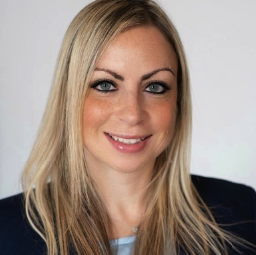By: ASUH Published: March 29, 2024
Nizan Geslevich Packin is a woman of many interests. As an expert in financial regulation, technology, privacy and information law, and FinTech, the University of Haifa alumna is a trusted resource regarding some of the most pressing issues in today’s society. From weighing in on Elon Musk’s legal drama with OpenAI to why regulations are needed for consumers who want to control their data, Packin has leveraged her years as an attorney and academic to shed light on these important topics.
Packin sat down with American Society of the University of Haifa (ASUH) to talk about her time at the school, her clerkship with the late Justice Salim Joubran, and how her experience has set her up for success as a leading legal expert in New York.

Q. What made you want to study at University of Haifa?
A. I debated what I wanted to study; it was a choice between medical school and something practical that was shorter in terms of commitment. The members of my family are either doctors or engineers, so that’s when I began thinking about the law — nobody could really give me any practical advice. I tested the waters to see what it was like and enrolled in a Law Degree program at University of Haifa.
As I completed my law degree, I realized that clerking at Israel’s Supreme Court was probably the best thing that I could do. I was interviewed and accepted to work in the late Salim Joubran’s chambers. He passed away two weeks ago, which was really sad because he was one of my main mentors and someone I aspire to be like. He was a person who believes in people and was a true testament for how it was possible to do good things for one another.
In my last year at University of Haifa, I participated in an exchange program at Cardozo Law School in New York, which was a semester long. It really introduced me to different legal systems and doctrines, as well as the international possibilities of practicing law that went beyond the scope of Israeli practice. From there I went straight to the Supreme Court. I met many other clerks, almost all of whom were determined to do an LLM (Master of Laws) in the U.S., mainly with the hope of doing a SJD (doctor of judicial science) and going back into academia, although others wanted to expand their international education.
I applied to New York law schools and was accepted to Columbia and NYU. I decided to go to Columbia, and while there, I used my time to intern for the Federal Trade Commission (FTC). I also externed for a judge in the Eastern District of New York. His name was Judge Weinstein and he was a prominent thought-leader who taught at Columbia for many years. Then, I practiced law at Skadden Arps in New York for six years in their financial restructuring group.
Eventually I completed my doctorate in law at the University of Pennsylvania, where my supervisor was David Skeel, one of the global leaders for financial restructuring. Then, I got back into academia, starting a decade ago at City University of New York, and in the last few years also at University of Haifa. I initially focused my research on financial regulation, but as emerging technologies increasingly started shaping more and more aspects of our lives, I gravitated more toward technology and the law, particularly writing about consumer protection, innovation, tech policy and tech-based services and products. This reflected the financial industry, which has also changed since the 2007/8 financial crisis. We’ve seen the rise of financial technology and I’ve really enjoyed working on issues related to it that I’m interested in.
Q. What did you learn at University of Haifa that set you up on your journey of success?
A. A few things were prominent and very useful for me, including the fact that very early on you had to get along with a diverse group of people – with different perspectives and worldviews – all in a collegial and respectful way. And I think that’s also one of the things that made Justice Joubran so special; he’s also from Haifa, and he insisted that throughout his time working on the Supreme Court he would spend his weekends in Haifa. He would drive from Jerusalem to Haifa every Thursday night, and then travel back again on Sunday morning.
There’s something unique about the human composition and interaction in Haifa, which is special. Some of these features were very noticeable during the degree, such as patience toward different groups and perspectives. If you’re not that familiar with it, you might be more annoyed or aggravated in different professional settings where people disagree with you. For me, it was a game-changer. Some of my peers from other Israeli universities were more used to the same types of people and perspectives. This was not the case for me at all – it was easier for me to adjust.
I also felt the University was always eager to give people opportunities if they could handle them. For example, I did the dual degree of Law with Economics. I was able to go onto the exchange program at Cardozo. One summer I took part in an exchange opportunity with the University of Oxford. I did a semester there on an international program in law and communications. Different types of initiatives were offered – they really tried to make them accessible to those who could handle them.
I’m also grateful for the ability to meet people earlier on. When my peers were thinking about international programs, I had already spent a semester abroad – learning in English – about federal and state regulation. The University was one of – if not the – first to take part in the European ERASMUS program. These were great experiences and they’re game-changing for people as they start their professional careers.
Q. What was it like growing up as a kid in Haifa?
A. Haifa is a unique city because of its diversity. When I speak to Israelis from other places, they may not have had the opportunity to grow up and be exposed to shared experience with Muslims, Christians and Druze. Some people in Israel can go their whole lives and not interact with some of these people. In high school it was just normal – I had several Druze friends. We’d go to the market together on weekends sometimes, and occasionally even had visiting students that came for a year with their Bahai families to live in Haifa. There are so many people who don’t know about this small but fascinating community.
Q. What are the Challenges and Opportunities in AI?
A. There are lots of risks and issues associated with AI. I’m teaching an international course this year with students from University of Haifa, seven students from Bocconi University in Milan, and 10 students from the University of Ottawa in Canada, with their two respective professors. This is a program that has been running for about a decade-and-a-half in the University of Haifa Law Department. The three of us are teaching them about technology and the law.
We cover AI policy and regulation. We’re at the beginning of a very interesting era. Some refer to it as the Internet 3.0 – i.e. a new iteration of the Internet, where everything is more decentralized and hyper-personalized. Whether it’s because of apps that recreate the ecosystem for us – like a video game that is tailored for you and your preferences – it is no longer one-size fits all. The more advanced these services are, the more they cater to you. There are a lot of advantages and disadvantages to having such a technologically decentralized era – based on emerging technologies. On the one hand there are more possibilities and cost-efficiency, where my needs can be catered to 24/7. But at the same time risks and hazards ranging from amplifying biases – because humans create these technologies and they are by default, biased, whether they intend to be or not. It’s harder to trace and track these biases. There isn’t always full disclosure; and even if there is it’s overwhelming for consumers. And even if they could spend a third of their lives reading contracts etc., they have no bargaining power. On top of that we have users with limited capacity, particularly minors.
We see how dangerous the gamification of money is, as well as addictions, such as to social media. We see all sorts of features that are concerning. Some get front-row seats, such as those up before Senate committees.
We also see it in the current Hamas-Israel war. These are cutting-edge issues that the entire world is dealing with. It’s not possible to put all these genies back into their bottles. Content moderation and gamification, alternative finance – e.g. Bitcoin, whose price has continued to rise. These are harder for the government to regulate because they are decentralized. Some of my recent research has centered on emerging technologies such as fintech to alternative finance.
Q. What would you say is the overarching theme of your career?
A. A recent study found that nothing would make 90% of Millennials and Gen-Zers more comfortable than knowing that their finances were in order. Technology should improve our abilities and it should empower us. There is a constant struggle between technology developers and corporate entities that seek to advance it for profit, of course. We really need to be able to better understand – and this has to be done in a collaborative effort with lawmakers, regulators and the private sector — how technology can supplement and enhance opportunities, rather than increase harms, and expose us to new ones. I focus my efforts on the delicate fine line to ensure that we use technology wisely, particularly in financial protection areas.


